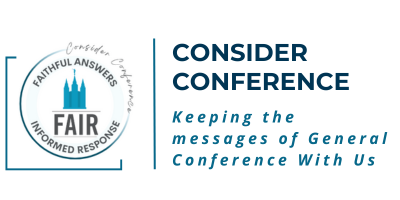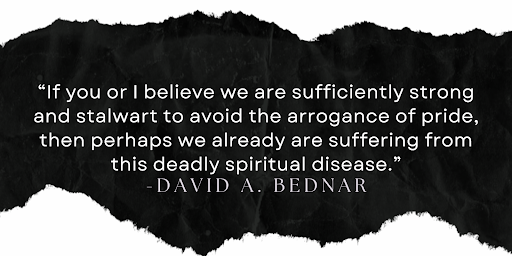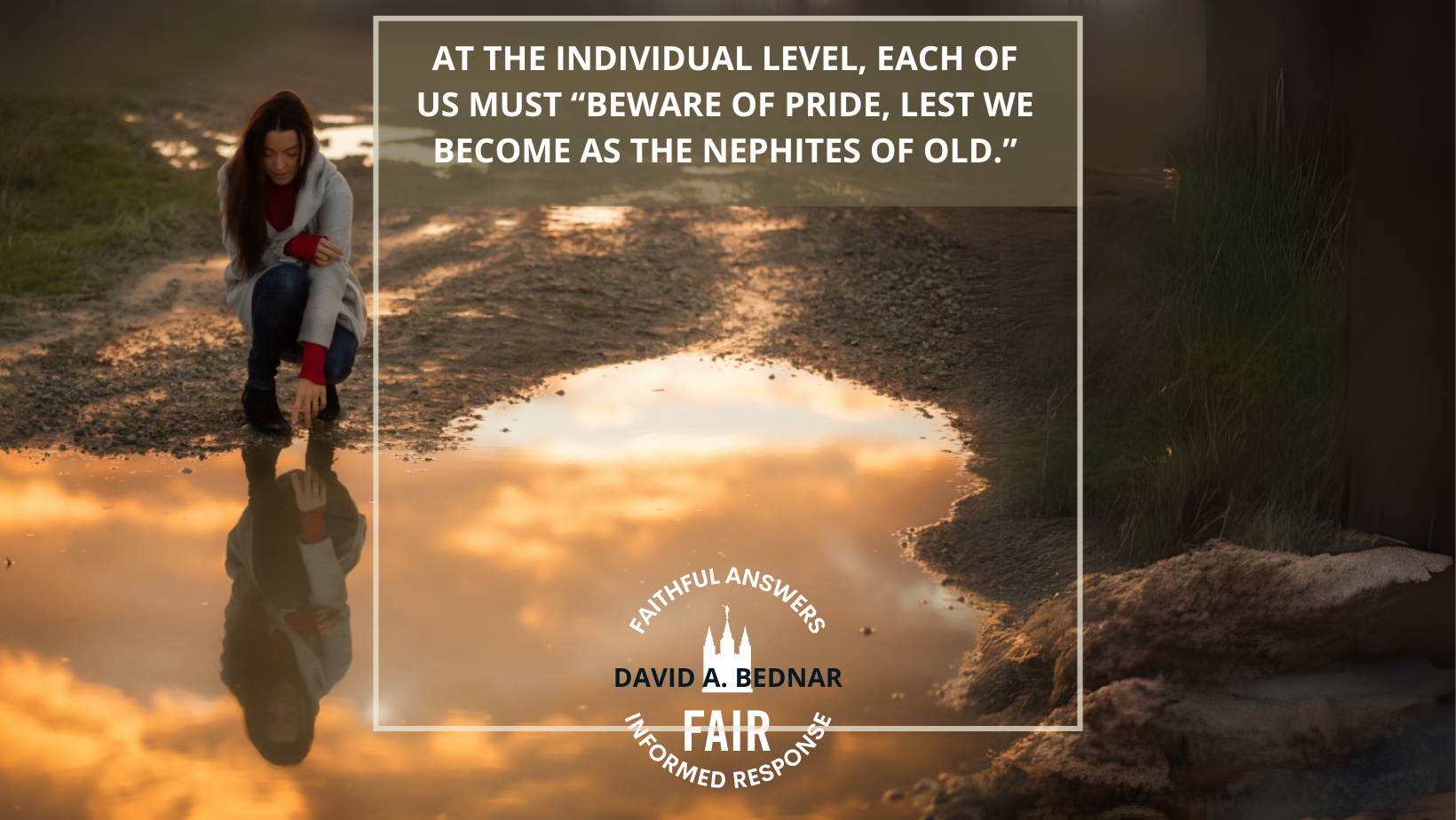What happens when prosperity becomes a pitfall? Can the blessings of wealth and comfort inadvertently lead us away from God?
In his powerful address, “In the Space of Not Many Years”, Elder David A. Bednar shares insights from the Book of Mormon, emphasizing how even a blessed and righteous people can fall if they become blinded by pride. Drawing on teachings from President Ezra Taft Benson, Elder Bednar reminds us that the Book of Mormon is not only a historical account but also a guide for our time. As we examine the warnings and contrasts between the Nephites and the Lamanites, we uncover lessons on faithfulness, humility, and the spiritual dangers of self-sufficiency over dependence on God.
Common Questions, Misconceptions, and Criticisms
Doctrine
- Is it possible to recognize spiritual blindness in ourselves?
- Common Misconception: Some people believe that spiritual blindness is impossible to discern in oneself, viewing it as a condition others may experience but not something they could personally suffer from. This misconception can lead to complacency and a false sense of security in one’s spiritual standing.
- Response: Elder Bednar warns that spiritual blindness often manifests subtly, as pride and self-reliance gradually take root. He highlights the Nephites as a sobering example: once a righteous people, they failed to see their spiritual decline because their focus shifted from God to their own perceived strength. Similarly, C. Terry Warner’s work on self-deception underscores that recognizing our own blindness requires humility and a willingness to confront uncomfortable truths about our motives and actions. Warner explains that self-deception keeps us locked in a cycle of justification and blame, preventing us from seeing our own role in spiritual or relational struggles.
Elder Bednar and Warner both affirm that self-awareness is not only possible but essential for overcoming spiritual blindness. Through prayer, reflection, and a sincere desire to align our lives with God’s will, we can begin to discern the ways in which pride or self-focus may be blinding us to spiritual truths. - Fallacy Check: This misconception often involves optimism bias, where individuals overestimate their ability to perceive their own flaws while underestimating the possibility of personal error. Elder Bednar’s counsel reminds us that this mindset is itself a sign of spiritual vulnerability.
- Resources: Bonds That Make Us Free by C. Terry Warner
Social Issues
- Do the Church’s teachings on wealth and prosperity promote a culture of material success?
- Response: Elder Bednar’s message emphasizes the opposite, warning that prosperity can lead to spiritual blindness. LDS teachings encourage members to view wealth as a stewardship to bless others, not as a measure of divine favor.
Elder Bednar’s talk directly counters the notion that the Church’s teachings on wealth and prosperity foster a culture of material success. Rather than promoting materialism, he emphasizes the spiritual dangers of prosperity. Using examples from the Book of Helaman, Elder Bednar highlights how the Nephites, once a righteous people, fell into pride and spiritual decay precisely because they allowed their wealth to distract them from their devotion to God.
He teaches that prosperity can become a “prideful curse” when it leads individuals to focus on their own self-sufficiency and material gain rather than relying on the Lord. This principle underscores that wealth is not an end in itself but a stewardship, intended to bless others and further God’s work.
Elder Bednar warns that prosperity can lead to spiritual blindness, where individuals “mock that which is sacred” and lose sight of their dependence on Christ. The Church’s teachings call for humility, gratitude, and a focus on eternal priorities rather than worldly success.
Thus, far from fostering materialism, the Church teaches that wealth is a test of faithfulness and a tool for service, reminding us that true happiness comes from living in harmony with God’s will, not from the accumulation of possessions.
-
- Fallacy Check: Straw man fallacy- This criticism often misrepresents the Church’s actual teachings by portraying them as advocating materialism or equating wealth with righteousness. In reality, Church leaders frequently caution against the spiritual dangers of pride and the misuse of wealth, as Elder Bednar’s talk illustrates. The argument attacks a distorted version of LDS teachings rather than engaging with their true intent. There’s also an Appeal to Emotion – by framing the Church as fostering material success, critics may evoke feelings of discomfort or resentment toward perceived wealth disparities. This emotional appeal can cloud an objective analysis of the Church’s teachings, which focus on using resources to bless others and further spiritual growth.
- Resources: What Matters Most Is What Lasts Longest
History
- We have the Bible – why is the Book of Mormon necessary?
- Response: The Bible is a sacred and foundational witness of Jesus Christ, but the Book of Mormon serves as a second witness, offering unique clarity and strength to the Lord’s message. As Elder Bednar teaches, the Book of Mormon was written for our day, containing lessons, warnings, and insights tailored to the challenges we face in the latter days. It complements the Bible, filling in gaps and resolving ambiguities that may arise from centuries of translation and interpretation.
- The Book of Mormon provides distinct doctrinal clarity on critical topics such as the Plan of Salvation, the nature of God and Jesus Christ, and the necessity of personal revelation. For instance, its teachings on the dangers of pride and the cycle of righteousness and apostasy, as seen in the Nephites’ downfall, are stark reminders of how easily we can stray if we lose focus on the Savior.
- Elder Bednar reminds us that the Book of Mormon is not merely a historical account but a guide for us to navigate today’s spiritual challenges. By studying it alongside the Bible, we gain a fuller understanding of God’s will and a more complete testimony of Jesus Christ. As Elder Bednar emphasizes, this additional witness fortifies our faith, helping us “beware of pride” and remain steadfast in a world that often seeks to distract us from eternal truths.
- Fallacy Check: The question suggests a binary choice: either the Bible is sufficient, or the Book of Mormon is unnecessary. This is an example of False Dilemma (Either/Or Fallacy). This ignores the possibility that both scriptures can coexist and complement each other, offering a fuller understanding of God’s plan.
Defending Divine Doctrines
Doctrinal Emphasis:
Elder Bednar warns of the insidious nature of pride, referencing the Book of Helaman to illustrate the fall of the Nephites. This doctrine aligns with apologetic principles, showing that spiritual decline often begins with small choices rooted in self-focus and neglect of spiritual priorities.
Application: Elder Bednar’s message helps clarify the LDS stance on humility and reliance on God. Readers can understand that LDS doctrine does not glorify wealth but cautions against its potential to distract from eternal truths.
Historical and Doctrinal Connections
Contextual Background
Elder Bednar reminds us that President Ezra Taft Benson declared the Book of Mormon as written for our day, guiding us to navigate modern challenges like prosperity and self-reliance. The Book of Helaman’s depiction of Nephite pride serves as a cautionary tale for contemporary readers, reminding them to avoid spiritual complacency.
Resources for Deeper Understanding: For further insights on pride and spiritual blindness, explore articles such as “Why Did the “Pride Cycle” Destroy the Nephite Nation?” on Scripture Central’s website or Elder Benson’s talk, “Beware of Pride.”
Living Apologetics
Practical Application
Elder Bednar’s talk offers a personal challenge to remain humble, especially in times of ease and abundance. Here are some ways readers can apply these teachings:
- Start a Conversation: Initiate a respectful dialogue with family or friends about how material success can influence spiritual priorities.
- Reflect on Personal Humility: In journal entries, reflect on areas of life where pride may be subtle but present, identifying ways to serve others and reduce self-focus.
- Set Daily Reminders: Use a daily reminder to pray for humility and dependence on God, even in seemingly mundane tasks.
Faith in Action
Consider ways you as a member of the Church of Jesus Christ of Latter-day Saints can model the humility and dedication of the Lamanites in Helaman’s account. Daily study of the Book of Mormon, prayer, and actively serving others are practical ways to remain spiritually grounded.
Quick Reference: Key Defenses and Facts
Defensive Highlights:
- Self-Awareness: Self-awareness is not only possible but essential for overcoming spiritual blindness.
- Warnings Against Pride: LDS teachings focus on the spiritual dangers of wealth and pride rather than material success as a blessing.
- Book of Mormon’s Unique Witness: Adds modern-day application and reinforces biblical truths for today’s spiritual challenges.
Top Apologetic Facts:
- Book of Mormon Context: The Book of Mormon was written for the latter days, offering warnings and insights that are directly applicable to today’s issues.
- Wealth as a Stewardship: Teachings in the Church advocate using resources to bless others, not as a means of self-aggrandizement. Wealth is a stewardship, not a sign of divine favor.
Conclusion
Encouragement and Reflection: Elder Bednar’s talk encourages each of us to recognize the potential danger of pride, even in seemingly small moments. The Book of Mormon’s timeless message offers us a model of humility and faith in the Lord’s wisdom, and a warning that we need to stay vigilant against spiritual complacency and pride.

“As we follow President Benson’s counsel and ask ourselves why the Lord inspired Mormon to include in his abridgment of the book of Helaman the accounts, admonitions, and warnings that he did, I promise we will discern the applicability of these teachings to the specific conditions of our individual lives and families today.”
Share your insight
Your thoughts and experiences can help others along their journey. Share them below, and let’s continue this conversation on remaining spiritually grounded.
The Consider Conference series by FAIR offers an in-depth look at recent General Conference talks to help members of the Church of Jesus Christ of Latter-day Saints navigate common questions, misunderstandings, and criticisms. Each post provides doctrinal insights, historical context, and practical ways to apply gospel principles in everyday conversations. Through this series, we hope to equip readers with faith-promoting resources that encourage thoughtful reflection, respectful dialogue, and a stronger foundation in gospel truths, fostering both personal conviction and meaningful discussions with others.
The post Faithful Foundations: Avoiding Spiritual Blindness in Times of Prosperity appeared first on FAIR.
Continue reading at the original source →






